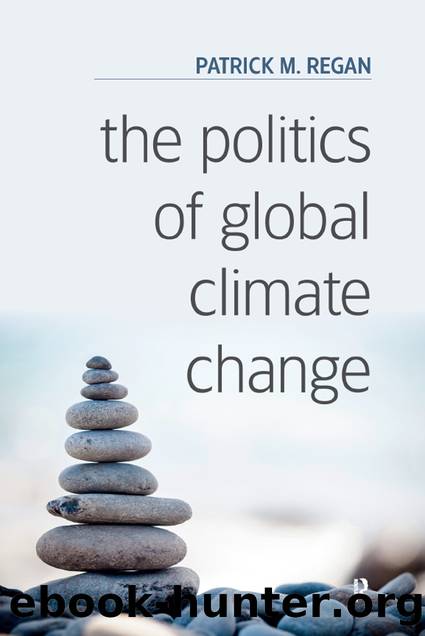The Politics of Global Climate Change by Patrick M. Regan

Author:Patrick M. Regan [Regan, Patrick M.]
Language: eng
Format: epub
Tags: Social Science, Sociology, Political Science, General
ISBN: 9781317253891
Google: 1BPvCgAAQBAJ
Goodreads: 27890819
Publisher: Routledge
Published: 2014-12-01T00:00:00+00:00
From Saving Whales to Saving Our Climate
Whales in the worldâs oceans and a stable climate are both collective goods, and in both cases, securing cooperation in the face of individually rational interests has posed problems. Today, however, enough whales are swimming the oceans that a tourist industry thrives around them, and this is a significant and positive reversal of the whaleâs fortunes over a reasonably short period of time. Such a reversal is imperative for the problem of carbon emissions, and the case of whales has something to teach us about how to go about achieving it.
Sometimes, dramatic events or evidence can change the way we think about costs and benefits. If the new information is sufficiently wrenching, it can make it difficult to deny causal processes and discount future benefits. When the ozone hole appeared in the Southern Hemisphere, it became hard to deny that something drastic was in motion, just as the scientific recognition of the link between smoking and lung cancer changed the way we see that private action of smoking. The decimation of the whale population made the cost of continued commercial whaling painfully stark, and even those who saw whaling as a sovereign right and for whom whale meat provided a significant amount of protein for their population could see the costs of doing nothing to prevent the populations collapse. Japan and Norway did not want a complete ban on whaling, but neither country has returned to the massive commercial whaling of its past. Japan may be violating the IWC moratorium if their scientific research can be seen as such, but this violation is relatively modest compared to the 27,000 whales they killed in 1965 (Friedheim, 2001). Japan could violate the moratorium by whaling at the level of their peak harvest, but they choose not to. This could be seen as progress in the fight to save the whales.
Whale hunting has a parallel to CO2 emissions in the sense that both are a function of consumption rates. The consumption of large quantities of whale meat dictates the killing of a large number of whales. The consumption of large amounts of fossil fuels for lighting, transportation, and industry will result in the production of large quantities of CO2 that will adversely affect our ecosystem. At the end of World War II and through the 1960s, whale meat was the most prevalent form of meat-based protein in the Japanese diet. Japan, and other countries, in the face of the complete collapse of whale populations, restricted their consumption of whale-based protein to a ânecessary level.â The alternative, with the disappearance of whales, would have been complete removal of whale meat from their diets. You could make an argument that the longer Japanese society lives on reduced levels of consumption, the more likely they are to continue to reduce whale protein as a cultural and dietary supplement. Cultural adaptation may be one result of a global ecological challenge (Wilson, 2002). A movement away from a reliance of fossil fuel
Download
This site does not store any files on its server. We only index and link to content provided by other sites. Please contact the content providers to delete copyright contents if any and email us, we'll remove relevant links or contents immediately.
| Anthropology | Archaeology |
| Philosophy | Politics & Government |
| Social Sciences | Sociology |
| Women's Studies |
Born to Run: by Christopher McDougall(7128)
The Leavers by Lisa Ko(6948)
iGen by Jean M. Twenge(5417)
Sapiens by Yuval Noah Harari(5372)
Spare by Prince Harry The Duke of Sussex(5197)
The Kite Runner by Khaled Hosseini(5181)
Machine Learning at Scale with H2O by Gregory Keys | David Whiting(4313)
Bullshit Jobs by David Graeber(4192)
Never by Ken Follett(3957)
Goodbye Paradise(3811)
Livewired by David Eagleman(3775)
Fairy Tale by Stephen King(3399)
A Dictionary of Sociology by Unknown(3085)
Harry Potter 4 - Harry Potter and The Goblet of Fire by J.K.Rowling(3074)
The Social Psychology of Inequality by Unknown(3031)
The Club by A.L. Brooks(2926)
Will by Will Smith(2920)
0041152001443424520 .pdf by Unknown(2846)
People of the Earth: An Introduction to World Prehistory by Dr. Brian Fagan & Nadia Durrani(2739)
